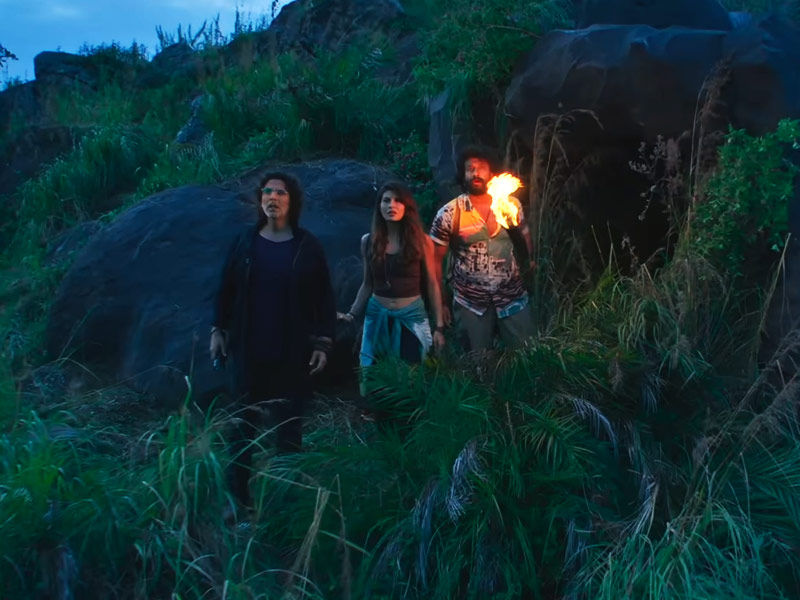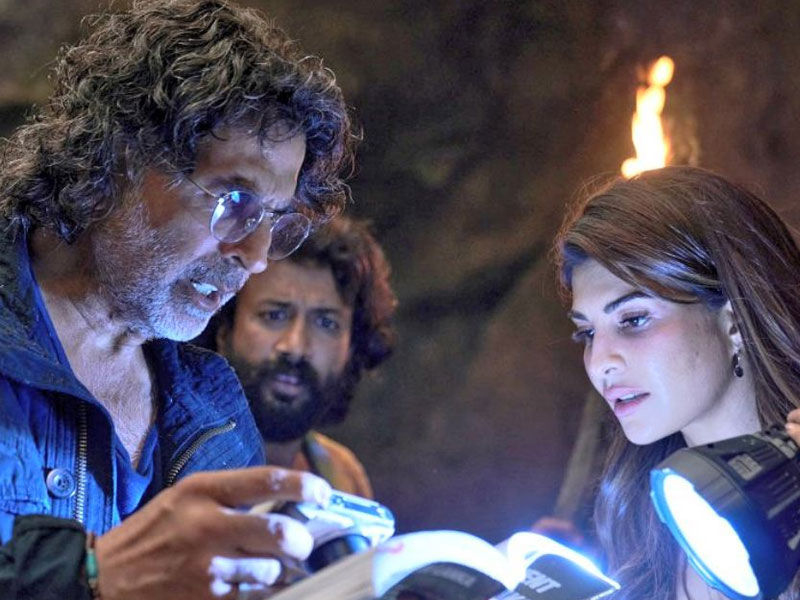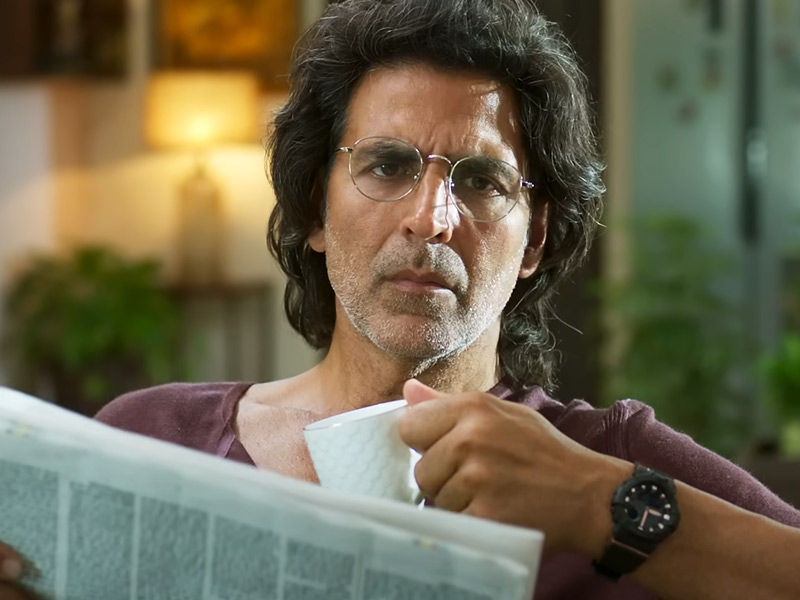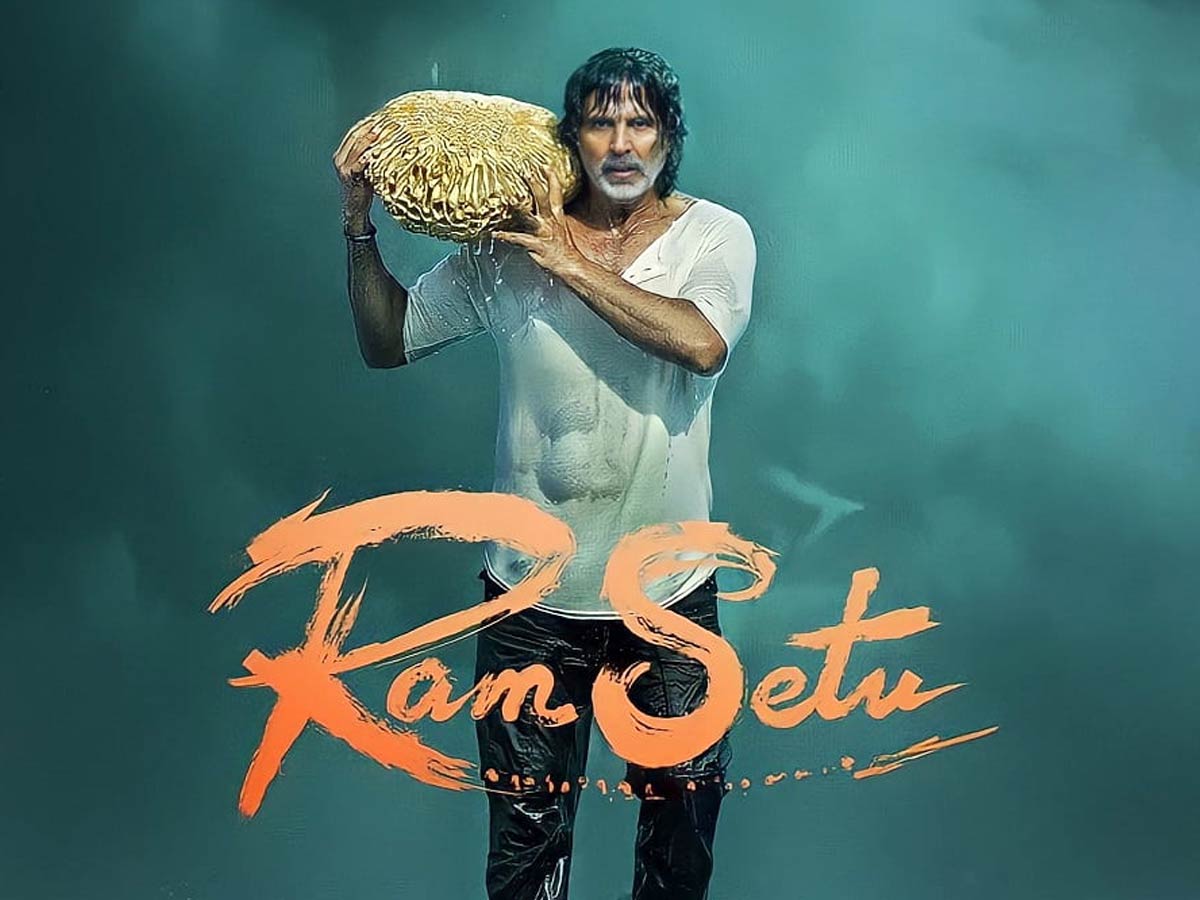Experts congregate in a floating laboratory on a ship at sea, and terminology like carbon dating, sonar imaging, and global warming are tossed about. But forget science; this isn’t even good fiction.
Ram Setu, an unstable bridge supported by extremely weak pylons, is a legendary atrocity written and directed by Abhishek Sharma. It’s a film about diving into the sea. But it just flails around in a quagmire of silliness.

Finally, the film, which does occasionally mention books and other forms of information, comes to an anticipated conclusion about the Ramayana, Lord Rama, and Ram Setu that reeks of WhatsApp university-level intelligence.
When confronted with a predetermined conclusion, the male protagonist responds, “Let us locate some evidence.” He sounds like a confused man in the Gobi Desert seeking a samosa vendor. He is not by himself. In Ram Setu, everyone, yes everyone, sounds the same and looks the same.

Ram Setu, produced by Prime Video and based on a script by creative producer Chandraprakash Dwivedi (who recently helmed Samrat Prithviraj, which had a broadly identical tale), pretends to be science fiction in parts. Experts congregate in a floating laboratory on a ship at sea, and terminology like carbon dating, sonar imaging, and global warming are tossed about. But forget science; this isn’t even good fiction.
Ram Setu is blatant, self-serving, and hysterical rubbish that rides on the back of a Bollywood celebrity with an unquestionable stranglehold on the genre. It is poorly written, shoddily staged, and poorly played. Except for Akshay Kumar’s studiedly professorial appearance, which may be considered a break from the usual, there is nothing new here. Aside from that, he begins by saying startlingly daring things that are out of character.
Also, Read Thank God: Laboured comedy that’s quite drab and uninviting

In one early scene, he remarks, “Dharm Sirf todta hai, Sanskriti jodti hai (Religion divides, culture unites).” Is it deserving of applause? It is easy to foresee that all of this will be too wonderful to be true. Ram Setu is built on half-baked beliefs about India’s past and present that seem more like ill-informed political speeches than careful judgments of analysts who know what they’re talking about.
The main character is Aryan Kulshreshtha, an archaeologist who first appears in Bamiyan, Afghanistan in 2007 as part of a subcontinental team of specialists sent to rescue the ruins of a Buddhist monument damaged by the Taliban. The man suddenly finds himself in the line of fire. By the skin of his teeth, he rescues himself and, in a tiny miracle, a Pakistani archaeologist.

Aryan then appears at the Delhi headquarters of a fictitious Archaeological Society (rather than a Survey) of India. His employer assigns him a new mission with the explicit direction to serve the interests of a politically connected shipping magnate (Nasser) who wishes to demolish the Ram Setu and construct a sea channel between India and Sri Lanka to maximize profit. Aryan takes the project against the advice of his history professor-wife Gayatri (Nusshratt Bharuccha).
He then digs a massive hole for himself and his department. He is made the fallen man and suspended. A lifeline is handed to him after he has cooled his heels at home for a spell. The shipping mogul who wants Ram Setu out of his way hires Aryan to unearth proof that the bridge predates Lord Ram and can be demolished without offending religious sensitivities.
The work requires Aryan to report to an onsite project manager (Pravesh Rana), who reveals to everyone that his devotion is to his company, even if it means ignoring facts. Needless to say, Aryan finds himself in the middle of a massive plot.

In an attempt to escape the hole he has dug for himself with the help of a mystery tour guide named AP (Satya Dev) and scientist Sandra Rebello (Jacqueline Fernandez), he develops for the film a succession of even greater holes that devour everything Ram Setu wishes to pass off as the ultimate truth. Of course, neither the character nor the actor is to blame for this.
Ram Setu will be remembered for delivering an unappealing goulash of history, mythology, and fatuous imagination. The mixture has clearly been made with a lot of zeal. Logic is what is lacking.
Ram Setu portrays the faith-versus-science discussion in such a ham-fisted and heavy-handed manner that it is clear from thousands of kilometers away that it isn’t interested in an educated engagement with veracity, belief, and reason. Sense is too far for Ram Setu to cross. Its arguments, which don’t hold much water in the first place, are drowned out by waves upon waves of inanity.

The film huffs and puffs its way to a very predictable climax, where the naysayers have no qualms about changing course and voting against rationality, revolving around an archaeologist who does not believe in God and proposes the theory that Ram Setu is a natural formation rather than a man-made structure.
Everything Ram Setu depicts takes place in pre-2014 India. This allows the screenplay to casting the current administration in a negative light, portraying them as corrupt rulers in collusion with robber barons out to make a fortune by destroying the nation’s cultural and religious legacy.
Fortunately, no politician in the picture resembles a real person. However, this is a tiny concession that does nothing to compensate for the film’s unbalanced viewpoint.

If the needless nonsense it peddles had been delivered with a little more flare, Ram Setu may have leapfrogged, Hanuman-style, over the obstacles it constructs for itself. However, it has no mitigating characteristics. It’s not even properly mounted. The visual effects are primitive, and the action sequences, which take place underwater, on land, and in the air, are pedestrian.
“Iss desh mein Ram ko jo nahin manta uska muh toh kala hona hi hai (In this country, one who rejects Lord Rama’s existence deserves to have his face blackened),” Ram Setu says.

Does anyone really need a two-and-a-half-hour film to make that claim? A comprehensive WhatsApp message from the creators would have sufficed. Ram Setu is a film that contributes nothing to the medium or the spectator. It’s a film about a floating stone who doesn’t know how to stay aloft. Even if you like Akshay Kumar, you should avoid it.





























